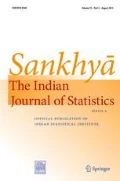Abstract
We consider the model: Y = X + ε, where X and ε are independent random variables. The density of ε is known whereas the one of X is a finite mixture with unknown components. Considering the “ordinary smooth case” on the density of ε, we want to estimate a component of this mixture. To reach this goal, we develop two wavelet estimators: a nonadaptive based on a projection and an adaptive based on a hard thresholding rule. We evaluate their performances by considering the mean integrated squared error over Besov balls. We prove that the adaptive one attains a sharp rate of convergence.
Similar content being viewed by others
References
Butucea, C. and Matias, C. (2005). Minimax estimation of the noise level and of the signal density in a semiparametric convolution model. Bernoulli, 11, 309–340.
Cai, T. (1999). Adaptive Wavelet Estimation: A Block Thresholding And Oracle Inequality Approach. Ann. Statist., 27, 898–924.
Cai, T. (2002). On adaptive wavelet estimation of a derivative and other related linear inverse problems. J. Statist. Plann. Inference, 108, 329–349.
Caroll, R.J. and Hall, P. (1988). Optimal rates of convergence for deconvolving a density. J. Amer. Statist. Assoc., 83, 1184–1186.
Cavalier, L. and Raimondo, M. (2007). Wavelet deconvolution with noisy eigenvalues. IEEE Trans. Signal Process., 55, 2414–2424.
Chesneau, C., Fadili, J. and Starck, J.-L. (2010). Stein block thresholding for image denoising. Appl. Comput. Harmon. Anal., 28, 67–88.
Cohen, A., Daubechies, I., Jawerth, B. and Vial, P. (1993). Wavelets on the interval and fast wavelet transforms. Appl. Computat. Harmon. Anal., 1, 54–81.
Comte, F., Rozenholc, Y. and Taupin, M.-L. (2006). Penalized contrast estimator for density deconvolution. Canad. J. Statist., 34, 431–452.
Delaigle, A. and Gijbels, I. (2006). Estimation of boundary and discontinuity points in deconvolution problems. Statist. Sinica, 16, 773–788.
Delyon, B. and Juditsky, A. (1996). On minimax wavelet estimators. Appl. Comput. Harmon. Anal., 3, 215–228.
Devroye, L. (1989). Consistent deconvolution in density estimation. Canad. J. Statist., 17, 235–239.
Fan, J. (1991). On the optimal rates of convergence for nonparametric deconvolution problem. Ann. Statist., 19, 1257–1272.
Fan, J. and Koo, J.Y. (2002). Wavelet deconvolution. IEEE Trans. Inform. Theory, 48, 734–747.
Hall, P. and Zhou, X.H. (2003). Nonparametric estimation of component distributions in a multivariate mixture. Ann. Statist., 31, 201–224.
Johnstone, I., Kerkyacharian, G., Picard, D. and Raimondo, M. (2004). Wavelet deconvolution in a periodic setting. J. Roy. Stat. Soc. Ser. B, 66, 547–573.
Lacour, C. (2006). Rates of convergence for nonparametric deconvolution. C. R. Math. Acad. Sci. Paris, 342, 877–882.
Lee, M., Shen, H., Burch, C. and Marron, J.S. (2010). Direct deconvolution density estimation of a mixture, distribution motivated by mutation effects distribution. J. Nonparametr. Stat., 22, 1–22.
Maiboroda, R. E. (1996). Estimators of components of a mixture with varying concentrations. Ukraïn. Mat. Zh., 48, 562–566.
Meyer, Y. (1992). Wavelets and operators. Cambridge University Press, Cambridge.
Pensky, M. and Vidakovic, B. (1999). Adaptive wavelet estimator for nonparametric density deconvolution. Ann. Statist., 27, 2033–2053.
Pensky, M. and Sapatinas, T. (2009). Functional deconvolution in a periodic setting: Uniform case. Ann. Statist., 37, 73–104.
Petrov, V.V. (1995). Limit Theorems of Probability Theory: Sequences of Independent Random Variables. Clarendon Press, Oxford.
Petsa, A. and Sapatinas, T. (2009). Minimax convergence rates under the \(\mathbb{L}^p \)-risk in the functional deconvolution model. Statist. Probab. Lett., 79, 1568–1576.
Pokhyl’ko, D. (2005). Wavelet estimators of a density constructed from observations of a mixture. Theory Probab. Math. Statist., 70, 135–145.
Prakasa Rao, B.L.S. (2010). Wavelet linear estimation for derivatives of a density from observations of mixtures with varying mixing proportions. Indian J. Pure Appl. Math., 41, 275–291.
Rosenthal, H.P. (1970). On the subspaces of \(\mathbb{L}^p \) (p ≥2) spanned by sequences of independent random variables. Israel J. Math., 8, 273–303.
Tsybakov, A. (2004). Introduction à l’estimation nonparamétrique. Springer Verlag, Berlin.
Van Es, B., Gugushvili, S. and Spreij, P. (2008), Deconvolution for an atomic distribution, Electron. J. Stat., 2, 265–297.
Willer, T. (2005). Deconvolution in white noise with a random blurring effect. Preprint LPMA
Author information
Authors and Affiliations
Corresponding author
Rights and permissions
About this article
Cite this article
Chesneau, C. Wavelet density estimators for the deconvolution of a component from a mixture. Sankhya A 73, 245–266 (2011). https://doi.org/10.1007/s13171-011-0017-x
Received:
Revised:
Published:
Issue Date:
DOI: https://doi.org/10.1007/s13171-011-0017-x


